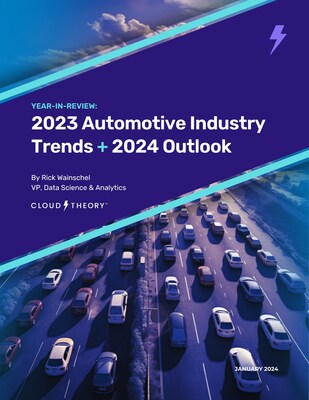Cloud Theory Releases Special Report: "2023 Review of Automotive Industry Trends and 2024 Outlook"
Press Releases
Jan 18, 2024
Cloud Theory uses its unique perspective on comprehensive supply and demand to review the 2023 automotive industry and predict five major issues that will dominate in 2024.
GRAND RAPIDS, Mich., Jan. 18, 2024 /PRNewswire/ — Cloud Theory, the automotive industry leader for real-time inventory and vehicle movement insights, has released a report that reviews 2023 automotive industry trends and points to five major issues predicted to dominate 2024.
The five issues explored in this report are:
- Supply Dynamics: A look at the rapid increase of new vehicle inventory due to the easing of post-COVID supply chain issues, though not without continuing challenges and complexities
- Demand Dynamics: How buying behaviors have shifted in relation to the supply rebound and the likely impact this will have on pricing and incentives
- Electric Vehicle Evolution: The ever-evolving trends associated with EVs as OEMs calibrate their investments and production in this sector to meet looming regulatory requirements
- Economic Influences: The impact of inflation and higher interest-rates on model and trim selections
- Inventory Efficiency: A view of the top 10 makes that sold their vehicles most efficiently when compared to their relative inventory position in the marketplace
“In a bigger picture sense, the automotive industry moved closer to pre-pandemic normalcy in 2023, but not without lingering aftereffects that will echo into 2024,” said Rick Wainschel, Vice President of Data Science & Analytics at Cloud Theory. “A rebound in supply without a commensurate increase in demand will define the overall narrative in the coming year, but 2024 will also be shaped by unique factors such as looming EV regulations, supply chain restructuring, continued high interest rates, and a heavier reliance on demand creation.”
The Cloud Theory report also points to its proprietary Inventory Efficiency Index results to identify the makes that fared best in 2023 and are well positioned to do so in 2024. High-scoring makes typically rely less on incentives and pricing flexibility to sell their inventories.
To view and download the report, click here.
About Cloud Theory
Cloud Theory is more than a concept. It is the eye of the storm, where cutting-edge data, software, and artificial intelligence meet deep industry knowledge and experience. Built for automotive manufacturers, agencies, and affiliates, Cloud Theory enables our customers to understand – in real time – the complex competitive world in which they do business and to make bold decisions that drive them forward. The combination of billions of data points, interactive tools, and expert consulting gives our clients the ability to weather any storm and find their way to clear blue skies. Learn more at cloudtheory.ai. To learn more about our entire portfolio of automotive brands, visit www.advancelocalautomotive.com.
For media inquiries, please contact:
Mike DeVilling
[email protected]
Jennifer Haun
[email protected]
![]() View original content to download multimedia:https://www.prnewswire.com/news-releases/cloud-theory-releases-special-report-2023-review-of-automotive-industry-trends-and-2024-outlook-302038551.html
View original content to download multimedia:https://www.prnewswire.com/news-releases/cloud-theory-releases-special-report-2023-review-of-automotive-industry-trends-and-2024-outlook-302038551.html
SOURCE Cloud Theory






